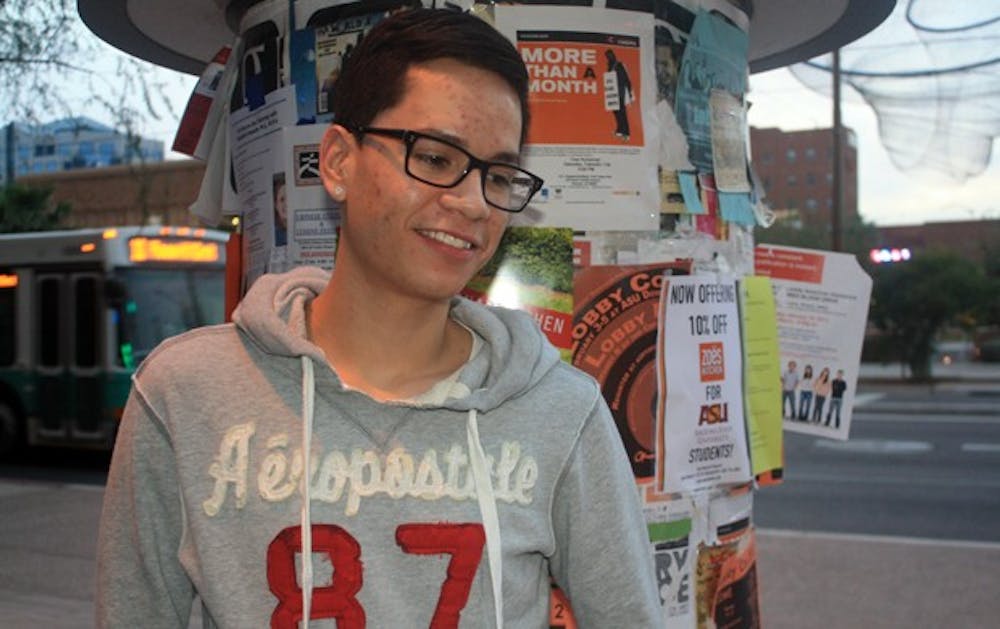Nonsense.
That’s the term co-creator of 3rd Space Vikter Medina uses to describe the various clubs, organizations and sub-communities created to give a comfort zone to gay people at a “Queer Cultura” poetry night.
As he says this outside of the house that the Worker Justice Center provided for 3rd Space’s event, men, women, students, straights, gays and artists chatter about their work, schoolwork, clothes and lives, supporting what Medina was trying to convey on a chilly night a few weeks ago.
3rd Space, born out of SB 1070’s freedom summer of July 2010, was established for individuals who fall into two or more of the following categories: being gay, being of “color” and gay, and in most cases, being undocumented and gay.
Medina calls 3rd Space a “queer liberation group.”
“[We] advocate from a spectrum of issues,” Medina says. “In every issue in Arizona, queer people are marginalized. We take the queer people and educate [them]. It’s bigger than just marriage, adoption and military.
“In the beginning, it was heavy on [advocating] for queer people in the prison system, but as we grew, we became very eclectic.”
3rd Space is a grassroots organization that receives help from Worker Justice Center, grants from the Hummingbird Collective organization that funds various groups in Arizona.
Before the controversial SB 1070 unfolded in Arizona, Medina says everything in society was focused on racial profiling and migrant communities. He then realized there was no spotlight shedding light on advocacy for “queers” in the prison system.
“There was one space for migrant justice and a second space for queer liberation, and they both intersected at a 3rd Space,” says Medina. “First, [3rd Space] was about advocating for queer migrants [through the] Dream Act.”
Medina lost his job in 2009. While unemployed, he had the time to start volunteering for the Puente Movement. He joined the US Social Forum, an organization dedicated to bringing solutions to the economic and ecological crisis, and is still blown away by the organization.
“I just felt something. I wanted to take this information [and show it to the Arizona Community],” Medina says. “When SB 1070 [unfolded], I decided to create a group dedicated for queer liberation.”
Medina consulted his friend who is now co-founder of 3rd Space about his idea. During the summer, Lady Gaga was coming into town. Medina and Diaz made contact with her manager and got the opportunity to sit down and speak with her.
After explaining their idea for 3rd Space and how they hoped she would protest with them against SB 1070, Gaga asked, (according to Medina) SB-what?
Diaz then took her wrist and wrote "stop SB 1070." During her show, Gaga pumped up her wrist and said, “We were born this way,” showing off her wrist.
“We just started an organization without knowing what ‘organizing’ means,” Medina says.
3rd Space helps gay people of “color” to immerse themselves into society and gives them a shot at diversity.
Although targeted for undocumented gays or “queers,” as Medina puts it, 3rd Space does not just target gay minorities and undocumented gays, but also allies with women and “working people.”
As 3rd Space’s Facebook says, “We are gay migrants, workers, queer anti-racist white people, students, gender non-variant people, organizers, questioning folks, people of color, straight allies, visionaries and learners.”
Medina says 3rd Space’s purpose is to establish its “own culture that is on another level of consciousness” and to bring gay people out of the custom gay clubs, connecting them to society.
3rd Space is made up of a collective group of queer people of “color,” and it differs from many of the LGBT groups, because these people are a part of the community, Medina says.
Although not associated with 3rd Space, two Arizona State University students commented on the struggles of being gay and of “color,” coming from a conservative Hispanic family.
“A lot of people think bullying happens at school. I did get bullied, but it most likely happened at home. It’s crazy how your own family bullies you,” ASU business management senior Daniel Garcia says.
Instead of going into depression, Garcia became angry. But he says that the struggles he faced with his conservative family led him to an anger that has opened the road to success.
“Being from a Hispanic culture, it’s a rough concept to explain to your parents, because they’re not really brought up with the idea of diversity and stuff like that,” communications junior Vicente Filerio (or just Chente) says. “When I first approached my mom about [being gay] she negated it, and said it was just a phase and that I’d get over it. I’ve yet to approach my dad about it; I feel like it’s something I’ll never be able talk to him about. I feel like he is even more backdated than my mom.”
Despite his struggle to break the cultural barrier, Chente is trying to shed light to tolerance through an unexpected way: silence. He says he has not spoken up like others have because being gay does not encompass his entire life.
“I don’t want to make people really like me just because I’m gay,” Chente says. “The thing is, I don’t want my sexuality to define who I am. I don’t want people to really like me because I’m gay; I don’t want people to really hate me because I’m gay.
“There are so many other things that make me me. For example, how weird would it be for me to say that I’m just a student? Who does that?”
3rd Space meets the first and third Wednesday of every month at a community house on 10th Avenue and McKinley Road at 8 p.m.
If you are interested in 3rd Space, visit their Facebook page for upcoming events or email 3rd.space.lgbtq@gmail.com.
Contact the reporter at noemi.a.gonzalez@asu.edu






